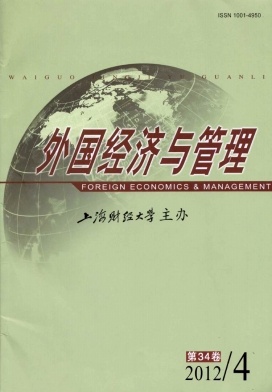企业高管腐败研究前沿探析
外国经济与管理 2012 年 第 34 卷第 04 期, 页码:73 - 80
摘要
参考文献
摘要
尽管现实中企业高管腐败已是一种普遍存在的现象,但却鲜见这方面的专题研究。有鉴于此,本文从企业高管腐败的基本内涵、类型与途径、经济后果、关键诱因和治理等四个方面系统回顾了国外相关研究文献,并在剖析现有研究所存在的不足的基础上对未来研究方向进行了展望,以期推动企业高管腐败研究的深化。
[1]Adams R B,et al.Powerful CEOs and their impact on corpo-rate performance[J].The Review of Financial Studies,2005,18(4):1403-1432.
[2]Aghion P and Tirole J.Formal and real authority in organiza-tions[J].Journal of Political Economy,1997,105(1):1-29.
[3]Bebchuk L,et al.Managerial power and rent extraction in the design of executive compensation[J].University of Chicago Law Review,2002,69(3):751-846.
[4]Cai H,et al.Eat,drink,firms,government:An investigation of corruption from entertainment and travel costs of Chinese firms[J].Journal of Law and Economics,2011,54(1):55-78.
[5]Chen C,et al.High-level politically connected firms,corruption,and analyst forecast accuracy around the world[J].Journal of International Business Studies,2010,41(9):1505-1524.
[6]Cheng S J and Indjejikian R.Managerial influence and CEO per-formance incentives[J].International Review of Law&Economics,2009,29(2):115-126.
[7]Doidge C,et al.Why do countries matter so much for corpo-rate governance?[J].Journal of Financial Economics,2007,86(1):1-39.
[8]Dyck A and Zingales L.Private benefits of control:An inter-national comparison[J].Journal of Finance,2004,59(2):537-600.
[9]Hart O and Moore J.Contracts as reference points[J].Quar-terly Journal of Economics,2008,123(1):1-48.
[10]Huang L J and Snell R S.Turnaround,corruption and medi-ocrity:Leadership and governance in three state owned enter-prises in mainland China[J].Journal of Business Ethics,2003,43(1-2):111-124.
[11]Hung H.Normalized collective corruption in a transitional economy:Small treasuries in large Chinese enterprises[J].Journal of Business Ethics,2008,79(1):69-83.
[12]Levendis J and Waters G.Corporate corruption and chaos:A formal recursive model[J].International Journal of Business and Management Science,2009,2(2):177-192.
[13]Luo Y.An organizational perspective of corruption[J].Manage-ment and Organization Review,2005,1(1):119-154.
[14]Morse A,et al.Are incentive contracts rigged by powerful CEOs?[J].The Journal of Finance,2011,66(5):1779-1821.
[15]Oler D,et al.Governance,CEO power and acquisitions[J].Journal of Finance,2011,8:2012-2045.
[16]Osuji O.Fluidity of regulation-CSR nexus:The multinational corporate corruption example[J].Journal of Business Ethis,2011,103(1):31-57.
[17]Pearce C L,et al.The roles of vertical and shared leadership in the enactment of executive corruption:Implications for re-search and practice[J].The Leadership Quarterly,2008,19(3):353-359.
[18]Rajan R and Wulf J.Are perks purely managerial excess[J].Journal of Financial Economics,2006,79(1):1-33.
[19]Xuan Y.Empire-building or bridge-building?Evidence from new CEOs’internal capital allocation decisions[J].The Re-view of Financial Studies,2009,22(12):4919-4948.
[20]Yermack D.Flights of fancy:Corporate jets,CEO perquisites,and inferior shareholder returns[J].Journal of Financial Econom-ics,2006,80(1):211-242.
[21]Zahra S A,et al.The antecedents and consequences of top management fraud[J].Journal of Management,2005,31(6):803-828.
[22]陈信元、陈冬华、万华林.地区差异、薪酬管制与高管腐败[J].管理世界,2009,25(11):130-142.
[23]黄群慧.管理腐败新特征与国有企业改革新阶段[J].中国工业经济,2006,23(11):52-59.
[2]Aghion P and Tirole J.Formal and real authority in organiza-tions[J].Journal of Political Economy,1997,105(1):1-29.
[3]Bebchuk L,et al.Managerial power and rent extraction in the design of executive compensation[J].University of Chicago Law Review,2002,69(3):751-846.
[4]Cai H,et al.Eat,drink,firms,government:An investigation of corruption from entertainment and travel costs of Chinese firms[J].Journal of Law and Economics,2011,54(1):55-78.
[5]Chen C,et al.High-level politically connected firms,corruption,and analyst forecast accuracy around the world[J].Journal of International Business Studies,2010,41(9):1505-1524.
[6]Cheng S J and Indjejikian R.Managerial influence and CEO per-formance incentives[J].International Review of Law&Economics,2009,29(2):115-126.
[7]Doidge C,et al.Why do countries matter so much for corpo-rate governance?[J].Journal of Financial Economics,2007,86(1):1-39.
[8]Dyck A and Zingales L.Private benefits of control:An inter-national comparison[J].Journal of Finance,2004,59(2):537-600.
[9]Hart O and Moore J.Contracts as reference points[J].Quar-terly Journal of Economics,2008,123(1):1-48.
[10]Huang L J and Snell R S.Turnaround,corruption and medi-ocrity:Leadership and governance in three state owned enter-prises in mainland China[J].Journal of Business Ethics,2003,43(1-2):111-124.
[11]Hung H.Normalized collective corruption in a transitional economy:Small treasuries in large Chinese enterprises[J].Journal of Business Ethics,2008,79(1):69-83.
[12]Levendis J and Waters G.Corporate corruption and chaos:A formal recursive model[J].International Journal of Business and Management Science,2009,2(2):177-192.
[13]Luo Y.An organizational perspective of corruption[J].Manage-ment and Organization Review,2005,1(1):119-154.
[14]Morse A,et al.Are incentive contracts rigged by powerful CEOs?[J].The Journal of Finance,2011,66(5):1779-1821.
[15]Oler D,et al.Governance,CEO power and acquisitions[J].Journal of Finance,2011,8:2012-2045.
[16]Osuji O.Fluidity of regulation-CSR nexus:The multinational corporate corruption example[J].Journal of Business Ethis,2011,103(1):31-57.
[17]Pearce C L,et al.The roles of vertical and shared leadership in the enactment of executive corruption:Implications for re-search and practice[J].The Leadership Quarterly,2008,19(3):353-359.
[18]Rajan R and Wulf J.Are perks purely managerial excess[J].Journal of Financial Economics,2006,79(1):1-33.
[19]Xuan Y.Empire-building or bridge-building?Evidence from new CEOs’internal capital allocation decisions[J].The Re-view of Financial Studies,2009,22(12):4919-4948.
[20]Yermack D.Flights of fancy:Corporate jets,CEO perquisites,and inferior shareholder returns[J].Journal of Financial Econom-ics,2006,80(1):211-242.
[21]Zahra S A,et al.The antecedents and consequences of top management fraud[J].Journal of Management,2005,31(6):803-828.
[22]陈信元、陈冬华、万华林.地区差异、薪酬管制与高管腐败[J].管理世界,2009,25(11):130-142.
[23]黄群慧.管理腐败新特征与国有企业改革新阶段[J].中国工业经济,2006,23(11):52-59.
引用本文
徐细雄. 企业高管腐败研究前沿探析[J]. 外国经济与管理, 2012, 34(4): 73–80.
导出参考文献,格式为:
下一篇:投稿须知(新版)





 5812
5812  422
422

